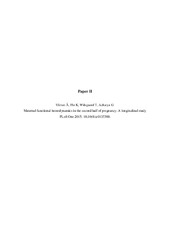| dc.contributor.advisor | Acharya, Ganesh | |
| dc.contributor.author | Vårtun, Åse Lillian | |
| dc.date.accessioned | 2016-10-28T11:52:41Z | |
| dc.date.available | 2016-10-28T11:52:41Z | |
| dc.date.issued | 2016-09-09 | |
| dc.description.abstract | Pregnancy causes significant changes in maternal circulation and cardiac function. In healthy pregnancy the blood volume, heart rate, stroke volume and cardiac output are known to increase and these physiological alterations are largely complete by mid-gestation. Investigation into cardiovascular response to dynamic changes in the loading condition of heart during pregnancy might contribute to better understanding of gestational cardiac adaption and help to identity women at risk of developing pregnancy complications such as hypertension, pre-eclampsia, or gestational diabetes. Normal heart is preload responsive and generally responds to an increase in ventricular filling (volume load) by a corresponding increase in stroke volume and cardiac output. We investigated functional hemodynamic response of the maternal heart to a volume load caused by passive leg raising in healthy women in the second half of pregnancy to establish reference values. Furthermore, we evaluated functional hemodynamic response to passive leg raising in pregnancies at risk of developing pregnancy complications as identified by abnormal uterine artery Doppler. We found significantly higher heart rate, stroke volume and cardiac output, and lower systemic vascular resistance and blood pressure among pregnant women compared to non-pregnant women at rest. The functional hemodynamic response to passive leg raising was similar among healthy pregnant and non-pregnant women, indicating that the physiological response is not modified in pregnancy at 22-24 weeks of gestation. However, we observed that healthy pregnant women have reduced cardiac contractility and preload reserve, especially in the last trimester. This makes pregnant women vulnerable to fluid overload and heart failure. Assessment of systemic functional hemodynamics may help identifying women who have cardiovascular maladaptation in pregnancy. Whether it helps to predict pregnancy complications and to improve management by risk stratification merits further investigation. | en_US |
| dc.description.doctoraltype | ph.d. | en_US |
| dc.description.popularabstract | Pregnancy causes significant changes in maternal circulation and cardiac function. In healthy pregnancy the blood volume, heart rate, stroke volume and cardiac output are known to increase and these physiological alterations are largely complete by mid-gestation. Investigation into cardiovascular response to dynamic changes in the loading condition of heart during pregnancy might contribute to better understanding of gestational cardiac adaption and help to identity women at risk of developing pregnancy complications such as hypertension, pre-eclampsia, or gestational diabetes. Normal heart is preload responsive and generally responds to an increase in ventricular filling (volume load) by a corresponding increase in stroke volume and cardiac output. We investigated functional hemodynamic response of the maternal heart to a volume load caused by passive leg raising in healthy women in the second half of pregnancy to establish reference values. Furthermore, we evaluated functional hemodynamic response to passive leg raising in pregnancies at risk of developing pregnancy complications as identified by abnormal uterine artery Doppler. We found significantly higher heart rate, stroke volume and cardiac output, and lower systemic vascular resistance and blood pressure among pregnant women compared to non-pregnant women at rest. The functional hemodynamic response to passive leg raising was similar among healthy pregnant and non-pregnant women, indicating that the physiological response is not modified in pregnancy at 22-24 weeks of gestation. However, we observed that healthy pregnant women have reduced cardiac contractility and preload reserve, especially in the last trimester. This makes pregnant women vulnerable to fluid overload and heart failure. Assessment of systemic functional hemodynamics may help identifying women who have cardiovascular maladaptation in pregnancy. Whether it helps to predict pregnancy complications and to improve management by risk stratification merits further investigation. | en_US |
| dc.description.sponsorship | UiT- Norges arktiske universitet. Institutt for kliniske medisin - Det helsevitenskapelige fakultet. | en_US |
| dc.identifier.uri | https://hdl.handle.net/10037/9912 | |
| dc.language.iso | eng | en_US |
| dc.publisher | UiT The Arctic University of Norway | en_US |
| dc.publisher | UiT Norges arktiske universitet | en_US |
| dc.rights.accessRights | openAccess | en_US |
| dc.rights.holder | Copyright 2016 The Author(s) | |
| dc.subject.courseID | DOKTOR-003 | |
| dc.subject | Medisinske fag | en_US |
| dc.title | Dynamic functional assessment of maternal hemodynamics in human pregnancy | en_US |
| dc.type | Doctoral thesis | en_US |
| dc.type | Doktorgradsavhandling | en_US |


 English
English norsk
norsk


